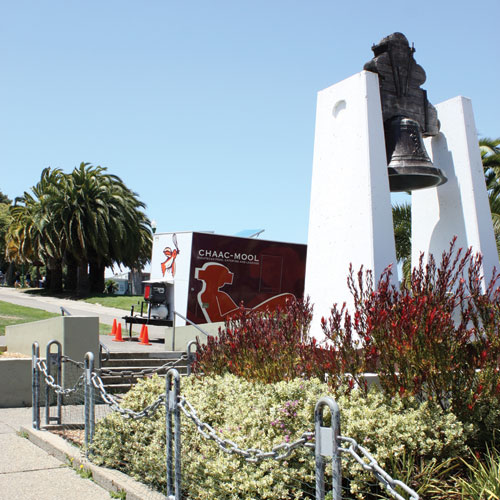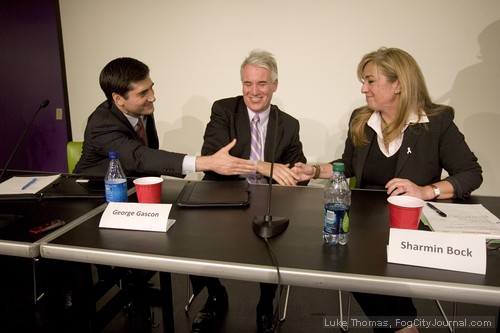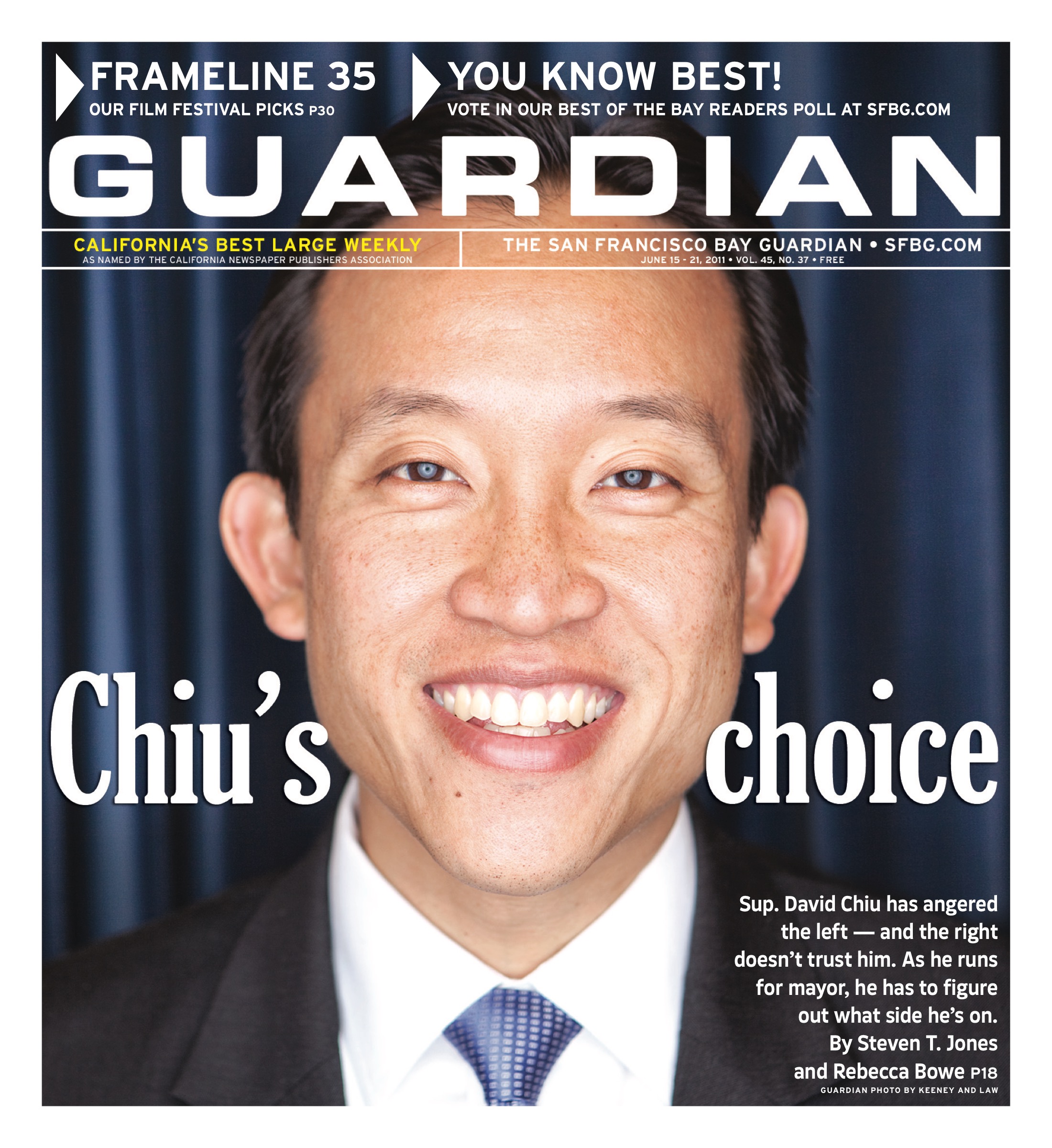For 10 years — from 2000 to 2010 — progressives controlled the San Francisco Board of Supervisors. It was a defining era in city politics, with the left-leaning board not only providing a check on the power of downtown-backed mayors Willie Brown and Gavin Newsom but producing a long list of important reforms that, generally, sought to level the playing field between the haves and have-nots.
It wasn’t the most harmonious decade. Battles between the legislative and executive branches of government often got nasty, particularly when the political and economic stakes were high — and after the national recession and fiscal conservativism left various constituencies fighting over shrinking public resources.
But San Francisco’s modern progressive era was still a decade of unprecedented responsiveness at City Hall to the interests of workers, renters, immigrants, the poor, bicyclists, environmentalists, communities of color, and the other component groups of the city’s progressive movement.
It was a decade in which San Francisco adopted one of the nation’s highest minimum wages, when most employers were required to provide employee health insurance or pay into an expanded city clinic program, when it became far more difficult for landlords to evict their tenants, and when developers knew they wouldn’t get their projects approved without significant concessions to the progressive constituencies.
Then suddenly, just as that decade ended and 2011 began, everything changed. And the person who presided over that change and did more to usher it in than any single individual was Board President David Chiu, who is now running for mayor.
Chiu was elected as a supervisor and then president in 2009 with progressive support, yet he now distances himself from the progressive wing and casts himself as playing the central role in a new political reality.
“Clearly, I’m at the center of the board,” he told the Guardian. “My goal as president of the board is to try to figure out how to bring our colleagues together to coalesce around values that move our city forward with our shared progressive values. And I think I’ve done a good job at that.”
Yet the left-leaning members of the board feel as if they’ve been pushed to the margins, particularly after Chiu created a committee structure that elevated the moderate supervisors who kept Chiu in the president’s seat. To many progressives, Chiu’s shift has allowed powerful interests to move forward while progressive constituencies fall behind.
“There’s been a palpable shift to the middle at City Hall,” said Sup. John Avalos, whose own mayoral campaign has galvanized progressives. “David has shifted to the center. He’s become more comfortable representing himself as a centrist — before, he wouldn’t have done that.”
There’s more to the story. While it is true that Chiu essentially switched sides — elected president by board progressives in 2009 and then reelected by its fiscal conservatives in 2011 — it is also true that there were other powerful players working behind the scenes to help sabotage the progressives and create a new political alignment.
But while Chiu talks constantly about representing the city’s “shared progressive values,” he’s a very different type of politician than the activists who ran the board after the first district elections. Supervisors like Tom Ammiano, Matt Gonzalez, and Aaron Peskin saw themselves as fighters, engaged in an ongoing epic struggle to organize and protect the less powerful against the wealthy, entrenched interests that have controlled the city for decades. That’s not Chiu’s style or inclination; he seems much more interested in making the system work than in changing it.
He’s also in a strange political place right now. He’s alienated a lot of his one-time allies on the left — but downtown and the big city power brokers still don’t fully trust him. And it’s not clear where he’s going find the political base he needs for a citywide campaign.
“In an sense,” Peskin said, “he’s a man without a country.”
CHIU’S ROOTS
On the evening of June 1, Chiu and members of his mayoral campaign team went to the Polk Gulch neighborhood for the first of 29 fundraising and organizing events his campaign was staging in San Francisco living rooms, a grassroots strategy borrowed from President Barack Obama.
Speaking to a small crowd, Chiu gave his well-rehearsed campaign rap. It starts with a nod to his parents, who emigrated from Taiwan to the United States in the 1960s. “I watched my parents sacrifice everything,” he said, adding that his experience was similar to that of many sons and daughters of immigrant parents. “I am motivated to serve because of the sacrifices they made.”
Chiu grew up in Boston, the oldest of three brothers, all of whom attended Harvard. His father was a doctor in private practice; his mother was a substitute teacher who poured everything into raising her sons. During his 2008 campaign for supervisor, Chiu’s parents temporarily relocated to San Francisco to pitch in, and they’ll likely return again once his mayoral bid is in full swing.
When Chiu was reelected board president in January — an outcome he achieved without the support of the most progressive supervisors — his parents watched from the front row. Chiu comes across as someone who grew up with a high expectation for success, something those close to him say is perhaps his strongest motivator.
So far, it’s been borne out in his relatively short political career. He became the first Chinese American politician to represent Chinatown when he was elected in 2008 with the support of predecessor Aaron Peskin and progressive groups. After taking his oath as supervisor, Chiu took advantage of progressive infighting to clinch the board presidency, catapulting to the second-most powerful position in the city just after emerging from his first run for political office.
“It’s a meteoric rise,” said Jon Golinger, who managed Chiu’s campaign in 2008. “He’s inherently talented, smart, friendly, a quick learner, and a hard worker.”
Chiu had excelled in all the positions he previously held, Golinger said — as a student at Harvard Law School; as an aide to Sen. Paul Simon of Illinois in Washington, D.C.; as a prosecutor in the San Francisco District Attorney’s Office; as a civil rights lawyer; and as the cofounder with Republican politician Matt Fong of a consulting firm called Grassroots Enterprises.
That company’s work with right-wing clients on campaigns that sometimes demonized liberals made some progressives nervous. Chiu countered by noting that most of its clients were liberal and that he didn’t work on the conservative campaigns. And he won the endorsement of the Guardian and progressive groups.
“My sense is that in all these contexts, people saw him as full of potential and had high hopes for him,” Golinger said.
Diane Chin, an associate dean at Stanford Law School, first met Chiu when he served as a law clerk, fresh out of Harvard. She later recruited him to join the board of Chinese for Affirmative Action. He also joined the board of the Chinatown Community Development Center, a post he was recruited to by his then-housemate Jane Kim, who was elected District 6 supervisor in 2010.
“David is somebody who is really committed to public service and is really thoughtful about governing,” Chin said. “I think of him as a progressive,” she added when asked how she’d describe his political stance. “But I know that is parsed 27,000 different ways in San Francisco.”
Kim echoed Chin’s comments, using the word “genuine” multiple times during an interview to describe Chiu and asserting that she too views him as a progressive. “David’s a genuine person, which is what I really like about him. I find him to be honest.”
She also emphasized how engaged he is with the business of governance. “He takes every decision seriously … he really believes in his vote.”
In a city where coalitions play an important role in governance, Chiu’s tendency to place himself in the swing vote position has increased his power — but some say his failure to cultivate or communicate with potential allies has sometimes turned them into enemies.
“I think David Chiu is a decent person, but he gets a little lost in his ambitions,” Avalos said, noting that Chiu placed himself in the pivotal position on big development projects and by naming himself as the fifth member of the Budget Committee and booting Avalos off a committee he used to chair. “He’s the one everyone wants to communicate with.”
THE PROBLEM WITH CIVILITY
Peskin objects to Chiu’s oft-repeated mantras — “shared progressive values” and “the new tone of civility” — calling them poll-tested platitudes that undermine the difficult struggles progressives must engage in to win support for their reforms against entrenched economic and political powers.
“It really means, in his case, that he’s not wiling to fight for things,” Peskin said. “Our shared progressives values are progressives who fight for change and to make the world more just. But in his case, it’s become code for stasis and not fighting for the little guy. And civility is just another way of being part of the problem and not part of the solution.”
Chiu told us he sees things differently.
“We certainly have a different style at City Hall, a leadership that still believes in our shared progressive values but that also believes we need to figure out how to work better with each other at City Hall and the diverse stakeholders we have in San Francisco,” he said. “So while people will speculate on the direction that we’re moving in, I actually think I am where I’ve always been.
“We can talk about specific decisions I’ve made,” he continued. “But I actually think that every key decision that some of you feel may have moved City Hall one direction or another, I would characterize as both coming from the values I’ve always had as well as reflecting a different style of leadership than what we’ve had at the Board of Supervisors.”
Chiu refuses to be pinned down to any ideological label — another clear difference with the previous three board presidents, who all saw themselves as part of the city’s left.
After discussing his belief in the potential of business tax exemptions to rejuvenate the Tenderloin and Mid-Market area (controversial legislation he championed and progressives opposed), we asked whether he considers himself a fiscal conservative.
“I consider myself to be someone who is fiscally disciplined,” he replied. He also said he is open to considering more revenue measures than he had already supported, and emphasized that the city budget had to be crafted in such a way that the pain of cutting to address a revenue shortfall was shared equally.
Golinger, who helped get Chiu elected, serves as president of the Telegraph Hill Dwellers, an influential District 3 neighborhood group that Peskin previously presided over. The difference between Peskin and Chiu, Golinger said, is “like a cup of very strong dark roast versus a mild blend that goes down easy.” Peskin aggressively tackled key land-use issues, he added, whereas Chiu appears hesitant to make waves. “David is far more comfortable pushing the positive than pointing out the flaws,” he said.
Chris Daly — the former supervisor who now owns Buck Tavern, which has become a hub for progressive political strategizing and gossip — doesn’t consider Chiu to be a progressive and says he probably never was. “His position has certainly changed. But I don’t think he’s changed who he is or what he believes.”
It’s a position Daly shares with his old ideological nemesis, Sup. Sean Elsbernd, who told the Guardian: “I don’t think David has changed who he is in any way. How he is, is how he’s always been.”
Instead, Daly said the problem was that progressives had brought Chiu into the fold because he was a far better alternative than downtown-backed Joe Alioto Jr. in the 2008 race for the District 3 seat on the board.
Elsbernd has a different analysis. “All four supervisors who got elected are more moderate than their predecessors,” he said of last supervisorial races, adding that he thinks that ideological difference was clear during the campaigns. “Nothing has happened in the last six months that surprises me.”
And while Daly used his last days as a termed-out supervisor trying to prevent Lee from becoming mayor and Chiu from being reelected board president, he concedes Elsbernd’s point that the battle was probably lost before then. “There’s a lesson we’ve learned — that when we’re bring up new leaders, there has be vetting. They need to be deeply rooted in our community,” Daly said.
END OF THE PROGRESSIVE ERA
Corey Cook, a political science professor at the University of San Francisco, said the rapid rise of Chiu has been a fascinating story, one that’s open to interpretations that vary from Chiu’s claims to constancy to the feeling among many progressives that he used and then betrayed them.
“That’s the $1 million question — whether he adapted to the changing politics, or whether he changed the politics. It’s probably a little of both,” Cook said, raising another question that voters will ponder this year. “Is he viewed as the great compromiser in a positive or negative way?”
Yet Cook said one thing is clear: “The almost decade-long progressive era has come to an end.”
Cook cited a series of Chiu votes — from development deals to the Twitter tax break — and the rare feat of consecutively being elected president with the majority support of the board’s two rival factions. But rather than switching sides, Cook said Chiu has hovered somewhere between them.
“I don’t think there’s anyone who would claim he’s ideologically in one camp or another,” Cook observed, noting how Chiu has opted to play the centrist swing vote. While many progressives might look down on that kind of ideological flexibility, Cook said voters in general won’t necessarily see it that way.
“After the divisive politics practiced by Peskin, Daly, Newsom, and others, perhaps being someone without a political base isn’t a liability at this point,” Cook said. “The sense is we’ve gotten beyond acrimony.”
Cook said it’s notable that even progressive supervisors are praising — or at least declining to criticize — the new era of civility that has settled in at City Hall, and that might feed Chiu’s message that he’s presiding over positive changes in the political system. “Everyone is contributing to the narrative that this is a good and productive kind of politics,” he said. “Even the progressive in this race has reinforced that narrative.”
Daly said it’s difficult and not tactically smart for Avalos to criticize the new tone at City Hall, even though he and other progressives argue that all this talk of consensus and civility is simply a ruse that favors the powerful, particularly given the resources that they can marshal to push their projects and how the history of political progress for the less-fortunate has always come through struggle and conflict.
“There is no inherent problem with civility. The problem is when you give up a principled position,” Daly said.
“If he can do it all with civility and compromise, but he still gets progressive results, more power to politics in San Francisco,” Peskin said.
Instead, they say recent votes show that powerful business interests have been getting their way at City Hall to a degree not seen since the days before the progressive era began — a message that Avalos and his progressive supporters will be delivering to voters this year.
“We are in an era of wealth being consolidated in fewer and fewer hands, and people are upset about that,” Avalos said, noting that City Hall leaders have aided and abetted that consolidation and refused to ask the wealthy to pay their fair share of taxes.
But Cook isn’t so sure, at least not without a real change in the city’s dominant political narrative now, arguing that that the still-sluggish economy is crowding out other concerns. “There are a bunch of problems with the progressive narrative right now. The thing that seems to be winning every argument is jobs.”
Political consultant David Latterman, who traditionally worked for downtown-backed candidates but is now consulting on Chiu’s mayoral campaign, agrees that job creation is the top issue. He also believes that voters are tired of the conflicts that have defined City Hall politics. “That model doesn’t really work. We need a more consensus-based approach and he represents that.”
It’s hard to see “consensus” in the series of 6-5 votes on the most divisive issues this year, but Cook said this year’s political realignment has drained the energy out of many of the conflicts. “Not only did the ideology of the board shift, but also the force and energy of the board,” he said.
Elsbernd said the biggest change in the board dynamics has nothing to do with Chiu. “It’s the absence of Chris [Daly]. He played a huge role here,” Elsbernd said of his ideological adversary, someone who defined what it meant to be a progressive and pushed his colleagues to remain true to that ideology. “And no one has filled that void.”
“I was the whip,” Daly agreed, using the legislative term for the enforcer of party or ideological discipline. “I was trying to get John to be that after I left. But with him running for mayor, he can’t really be the bad guy.”
Similarly, Chiu’s replacement of Peskin also drained the chamber of much of its ideological energy, particularly after he and Daly’s successors opted for a centrist governing style after being elected as progressives who promised to fight for tenants and the less powerful.
“The realignment didn’t happen at the ballot box. The realignment happened with people who ran as progressives and lost their way,” Peskin said.
WHERE’S THE CENTER?
Chiu argues that there’s nothing inconsistent between his progressive values and his centrist governing style.
“I think the center of the city shares San Francisco progressive values. It’s what stood up for universal health care, it’s what supported sick leave, it’s what supports a living wage, it’s what supports the opportunity for everyone to be able to live here. And that means that tenants are not being evicted; it means homeowners are not being unfairly or illegally foreclosed upon; it means that immigrants get to have a real opportunity here in an environment where they are respected. I think that is the center of SF values,” Chiu told us.
Nonetheless, there is near-universal agreement that the center of San Francisco politics moved to the right this year. Power has consolidated around Mayor Lee, as well as those who convinced Chiu to put him there, including the powerful players who helped elect District 6 Sup. Jane Kim, who has notably been withholding her mayoral endorsement.
The perception that Chiu switched allegiances was reinforced by his picks for board committees, which gave the board’s most fiscally conservative members the most power, including naming Sup. Carmen Chu as chair of the Budget Committee and placing Sups. Mark Farrell and Elsbernd on the Rules Committee, where they’ve been actively sabotaging progressive appointments and initiatives.
Chiu’s defense for his committee structure was that their decisions could be reversed by the full board. “We have reversed the handful of decisions that have come out of there that may have been problematic,” Chiu said of the Rules Committee recommendations, even though he supported some of the most controversial recommendations, such as voting against the progressive favorites for the Police and Ethics commissions.
When we relayed the progressive criticism of an Ethics Commission that is ineffective at best and corrupt at worst — refusing to enforce any Sunshine Ordinance Task Force decisions, rubber-stamping every ethics waiver it receives, and failing to investigate even clear campaign finance violations that had been exposed by the press — Chiu offered only hollow rhetoric. “The Ethics Commission needs to continue to fight for transparency, fight for accountability, fight to make sure lobbyists, political candidates, folks who work for city government are held to the highest ethical standard.”
“GOVERNMENT WAS DYSFUNCTIONAL”
The kickoff for Chiu’s series of neighborhood campaign events was held in the living room of Ron Case and Carolynn Abst, cofounders of Lower Polk Neighbors (LPN). The room, which looked out over Polk Street, was adorned with elephantine tropical shrubs and a row of birch branches lining the entranceway against a lavender wall.
LPN consists of about 35 people and was formed to clean up the streets, beautify the neighborhood, and promote public safety in partnership with law enforcement. Case and Abst, both architects, purchased and renovated the property 11 years ago. Things didn’t start out smoothly, Case said, since they were accused of gentrifying the neighborhood. The group has come under fire in the past by groups like Gay Shame San Francisco, a radical queer organization, which faults LPN for trying to change the neighborhood by working with police to drive out the homeless, drug addicts, and the down-and-out.
The small crowd was made up of mostly white, middle-aged professionals from Districts 2 and 3 (one introduced herself by saying she was friends with D2 Sup. Farrell). Chiu told the group that he had decided to run for office in 2007 for one reason: “City government was frankly pretty dysfunctional.” Politicians from different political factions bickered with one another, he said, and “they literally couldn’t even sit in the same room.”
Chiu described the challenges he hoped to tackle as mayor. First, San Francisco is doing a poor job “becoming the 21st-century economy” it has the potential to blossom into, he explained, so he wants to look at ways to stimulate job growth. Second, steps have to be taken to protect tenants and working-class residents by ensuring San Francisco does not turn into an exclusive bedroom community for Silicon Valley professionals. Third, the transportation infrastructure needs to be revamped since Muni is always late and pedestrian fatalities are unacceptably high. Fourth, he wants to find ways to streamline the byzantine bureaucracy of city government by cutting through red tape to boost efficiency.
It wasn’t clear if the tenant or transit messages were resonating with this particular crowd, which Chiu later said contained faces that were new to him. One of the questions he got was whether he thinks it is helpful to have a dearth of Republican representation in city politics. To this, he responded that San Francisco’s political factions are split more into progressives vs. moderates “and that gridlock has held us back from finding commonalities.”
Chiu had to cut out of the architects’ home early to make it to the second living room meeting that night in the Outer Sunset. When he slid into the passenger’s seat of a Zipcar (Chiu doesn’t own a car and primarily commutes by what he calls “a really cheap beater bike”), his driver and campaign volunteer handed him dinner in a takeout container. Chiu is constantly eating on the go since he attends up to five meetings and campaign events each night. Dark rings under his eyes suggested a lack of sleep.
The people who came to the second living room meeting represented a different cross-section of San Francisco, mostly Asian professionals in their 20s and 30s. This one was at the home of Ramie Dare, a campaign volunteer and former classmate of Chiu’s from graduate school.
Chiu ran through the campaign rap again. His speech was followed by a presentation from a campaign volunteer who distributed flow charts and tables describing how they would execute the grassroots-level campaign strategy. Using Google Earth, he zoomed in to Dare’s neighborhood. According to the data linked with the map of surrounding turf, “we have 825 registered voters and 435 frequent voters” in the area, he explained. This was clearly going to be a tech-savvy campaign.
CAMPAIGN CHALLENGES
But it’s going to be a campaign with serious challenges. While progressives feel betrayed and abandoned by Chiu, their ideological opponents downtown also have yet to embrace him, not trusting him to fight for them because he has sought to assert his independence from their agenda.
Chiu was openly considering a deal with Newsom to be named district attorney — which would have allowed Newsom to appoint his replacement in D3. Chinatown power broker Rose Pak was furious — he hadn’t discussed the move with her.
Even those around Chiu have emphasized his independence from Pak, who has desperately been looking for someone she could count on to back and prevent Yee from winning the mayor’s office. If Chiu can’t trusted to carry water for Pak’s Chinese Chamber of Commerce agenda, she will likely throw her support behind a different candidate.
“David Chiu has no chance of winning the mayor’s race,” Daly flatly declares. “He has no base, there are too many people fighting for the middle, and he has no clear path to victory.”
Chiu cites his record as a champion for tenants’ rights as one of three areas where his progressive credentials are strongest, along with his advocacy for immigrants’ rights and improving Muni.
“Our shared progressive values are very important, and they’re something I’ve been fighting for before I came into office as well as while I’ve been in office,” he said during a Guardian interview. “I am the one major mayoral candidate in this race who is a tenant, and I’ve stood up for tenants’ rights during my time before I was in office,” he said. “I’ve stood with tenants time and again throughout my time in office.”
Yet Chiu was the swing vote that approved the Parkmerced overhaul, an ambitious development project that would substantially increase density at the housing complex while demolishing 1,500 rent-controlled units.
“Chiu reached a back-room deal with the developer and provided the crucial sixth vote to approve the largest demolition of rent-controlled housing in San Francisco since the redevelopment of the Fillmore,” Influential tenant advocate Dean Preston, who heads a statewide organization called Tenants Together, wrote in an editorial on BeyondChron.org (which has generally been supportive of Chiu) the following day. “Despite a good record on tenant rights issues before his work on Parkmerced, Chiu has now earned the distrust of tenants across the city.”
But Chiu insists the Parkmerced deal had to happen.
“Not doing anything was not in the best interest of the city,” Chiu said, reiterating that he had thought it was the best choice for the sake of the city when asked whether he was concerned that his decision had sparked the ire of tenant groups. Despite the criticism and fallout from his choice, Chiu seems to genuinely believe his explanation although opponents of the deal just as strongly believe it speaks ill of Chiu.
“The Parkmerced vote is really a line of demarcation because there are acts that could have been taken by the board that could have insured the tenants will be taken care of — and on a 6-5 vote that didn’t happen,” Peskin said. “This isn’t the politics of compromise; it is just compromised politics,”
A little more than a week after casting the swing vote for Parkmerced, Chiu sought the endorsement of the San Francisco Building & Construction Trades Council.
Sup. Eric Mar, a strong tenant advocate, defended Chiu’s vote. “Though he voted for the Parkmerced development, I think he tried very hard … to listen to the concerns of the tenants and to try to build in stronger protections for the tenants,” Mar told us.
He also rejected the view that Chiu is no longer a progressive. “I’ve always known him to be somebody that has strong progressive values,” he said, noting that Chiu often votes along with left-leaning colleagues.
Peskin said there is a silver lining to the troubling board votes and the political realignment at City Hall. After 10 years with a progressive majority on the board, many leftist activists moved on to other struggles, confident that the board would defend the interests of the poor, renters, and others without much economic or political power.
“This is a wakeup call,” Peskin said. “Now it’s back to the ’80s and ’90s, with San Franciscans realizing that they’re fighting for the soul of their city again.”
TAKING SIDES
Chiu articulates a vision for city government that has things running more smoothly: Political factions work in collaboration with one another rather than being at odds; Muni is upgraded to become an efficient transportation system serving a world-class city; and the way small business interfaces with city agencies is streamlined.
The board president thinks deeply about technical issues in government and how to improve the nuts-and-bolts of the system. What sets Chiu apart from that of his predecessor and the political leaders who have traditionally defined themselves as progressives, however, is that they considered themselves as leaders of the struggle to challenge an entrenched power structure represented by big business, major developers, and moneyed consultants and lobbyists. And — generally speaking, with some exceptions — they took their cues from the activists organizing around key issues.
While Chiu was willing to remove the six-vote roadblock to Parkmerced by securing what he seemed to think were adequate amendments, a substantial group of Parkmerced tenants bitterly opposed the project — and Chiu was not willing to act on their behalf to halt the plan from moving forward.
And while the dynamics of San Francisco’s political realignment may seem like a discussion topic of interest only to a narrow group of wonky insiders sipping beer at Buck Tavern, the consequences of the shift has real-life implications. As commissioners vetted by a more moderate Rules Committee make decisions that favor private over public interests, and as major development projects such as Parkmerced and Treasure Island march forward — bringing with them more wealthy homeowners — the lives of everyday San Franciscans will be changed.
Saving the soul of the city — and protecting the people who suffer when budgets are cut and affordable housing is lost — isn’t just a management job. It’s a fight, sometimes a decidedly uncivil fight, against people who have more money and power. That’s what has defined the progressive movement in this city — and people who walk the line down the center, like Chiu, will eventually have to decide which side they’re on.
















